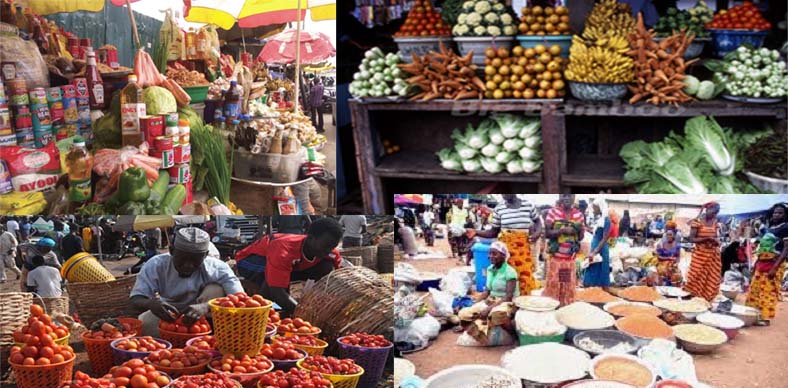Nigerians are finding it more difficult to feed themselves, as food inflation rose to 40.66 per cent in May.
This was as the cost of food rose by 61 per cent from 25.25 per cent in June 2023 to 40.66 per cent in May 2024, highlighting a steady rise in the cost of living.
This is according to an analysis of the latest Consumer Price Index and Inflation report released by the National Bureau of Statistics.
The CPI measures the average change over time in the prices of goods and services consumed by people for day-to-day living.
On Saturday, the NBS disclosed that headline inflation moved by 0.26 per cent to 33.95 per cent from 33.69 per cent recorded in April.
The report noted that the inflation rate climbed to a 28-year high since March 1996 on higher food and transport prices.
It said, “In May 2024, the headline inflation rate increased to 33.95 per cent relative to the April 2024 headline inflation rate which was 33.69 per cent.”
The statistics agency also reported major contributing items to headline inflation in May 2024 including food & non-alcoholic beverages (contributing 17.59 per cent), housing, water, and electricity, gas & other fuel (contributing 5.68 per cent), and clothing & footwear (contributing 2.60 per cent).
A breakdown of the data showed that the price of food commodities increased steadily from 25.25 per cent in June, to 26.98 per cent in July, 29.34 per cent, 30.64 per cent in August, 31.52 per cent in September, 31.52 per cent October, 32.84 per cent in November and 33.93 per cent as the end of December 2023.
The rate further increased to 35.41 per cent in January, 37.92 per cent in February, crossed the 40 per cent mark in March, 40.53 per cent in April and 40.66 per cent in May.
NBS said the rate rose to 40.66 per cent in May, compared to the 24.82 per cent reported in the same month last year — indicating an increase of 15.84 per cent points.
The bureau said semovita, oatflake, yam flour prepackage, garri, bean, etc (which are under bread and cereals class), Irish potatoes, yam, water yam, etc (under potatoes, yam and other tubers class), contributed to the year-on-year increase in the food inflation rate.
Other contributors are palm oil, vegetable oil, etc (under oil and fat), stockfish, mudfish, crayfish, etc (under fish class), beef head, chicken-live, pork head, and bush meat (under meat class).
“The food inflation rate in May 2024 was 40.66 per cent on a year-on-year basis, which was 15.84 per cent points higher compared to the rate recorded in May 2023 (24.82 per cent).
“The average annual rate of Food inflation for the twelve months ending May 2024 over the previous twelve-month average was 34.06 per cent, which was 10.41 per cent points increase from the average annual rate of change recorded in May 2023 (23.65 per cent),” the report said.
Similarly, Bauchi, Kogi, and Oyo are Nigeria’s three most expensive states on a year-on-year basis after recording the highest All-Items Inflation in May 2024.
The report said in May 2024, the All-Items inflation rate on a Year-on-Year basis was highest in Bauchi 42.30 per cent, Kogi (39.38 per cent Oyo (37.73 per cent).
On the flip side, Borno (25.97 per cent), Benue (27.74 per cent) and Delta (28.67 per cent) recorded the slowest rise in Headline inflation on a Year-on-Year basis.
In recent years, food prices have been on the rise across Nigeria. The situation deteriorated due to the impact of government policies such as the removal of subsidies on petrol, among others.
The upward trend in the prices of these staples and other products has weakened the purchasing power of many citizens, making it difficult for many households in the country to afford daily meals.
At the March Monetary Policy Committee meeting, the Governor of the Central Bank of Nigeria, Olayemi Cardoso, said that the huge purchase of foodstuffs by the government as palliatives is contributing to the galloping food inflation in the country.
The CBN governor noted that inflationary pressure had failed to abate despite the hike in the interest rate in February.
He said, “Staff reports show that the principal drivers of acceleration in inflation are hikes in food and energy prices which are associated with structural factors. Further, new dimensions of inflationary pressure are emerging. First, ‘seller inflation’ arising from the oligopolistic structure of commodity markets such as noticed in the prices of local commodities is gaining significance. In addition, huge purchases by the government for distribution as palliatives to vulnerable citizenry is adding another dimension to the food price inflation, with seasonal factors of food price increases during religious fasting and festive periods, adding price cyclicality.”
Commenting, an economist with Lotus Beta Analytics, Shadrach Israel, expressed concern about the alarming rise in inflation rates, stating, “The surge in annual inflation rate from 21 per cent to over 30 per cent in just a year, and the persistent 60 per cent food inflation rate, are clear indicators of underlying structural issues in the economy.”
Israel urged the government to take immediate action, implementing a multi-pronged approach, including monetary policy tightening, supply-side reforms, social protection programmes, and structural reforms to address the underlying issues driving inflation.
“The government must take immediate action to restore the purchasing power of its citizens and promote economic growth and stability.
“The fact that food prices have increased by 50 per cent compared to last year is particularly concerning, as food is a significant component of household expenditure in Nigeria,” Israel added.
“The government must address the underlying structural issues, such as the heavy reliance on oil exports, and promote economic diversification.”
A development economist Jonathan Thomas, also stated, “The impact of inflation on the Sallah celebration is a clear example of how economic instability can affect the welfare of citizens.
“The significant decrease in purchasing power has made it challenging for Nigerians to afford necessities, dampening the spirit of the celebration.”
Thomas described the high insecurity which has displaced many farmers from the farm belts in the country is a significant structural issue that needs to be addressed.
“Nigeria must fight insecurity to a standstill to help farmers return to their farms that way, food inflation can be tackled while the government should also diversify its economy to reduce its vulnerability to external shocks and promote sustainable economic growth.
“The government must prioritise economic reforms and diversification including tackling insecurity to ensure a more prosperous and stable future for Nigerians,” he said.




